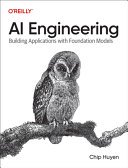AI Engineering by Chip Huyen — Book Review
In the ever-evolving landscape of technology, few topics ignite as much curiosity and debate as artificial intelligence. The concept of machines that can learn, adapt, and perhaps even think is both thrilling and daunting. Chip Huyen’s “AI Engineering” enters this arena with the promise of demystifying the complexities of building AI systems, much like a skilled guide leading you through the labyrinthine corridors of an ancient city, revealing both the beauty and the intricacies along the way.
From the outset, “AI Engineering” presents itself as more than just a technical guide; it’s an exploration—a journey into the heart of what makes AI tick and how we, as engineers, can harness its potential responsibly. Huyen’s approach is reminiscent of a seasoned storyteller who respects the intelligence of their audience, yet doesn’t shy away from explaining the nuances that make AI engineering both a science and an art.
The tone of the book is refreshingly conversational, a characteristic that is not always common in technical literature. Huyen has a knack for breaking down complex concepts into digestible insights without diluting their essence. This makes the book accessible not just to seasoned professionals in the field of technology but also to curious newcomers who wish to peek behind the curtain of AI’s enigmatic world. The pacing is deliberate, allowing the reader to absorb the material without feeling overwhelmed. Each chapter builds upon the last, creating a cohesive narrative that feels both educational and engaging.
The ideal audience for “AI Engineering” is diverse. It’s a valuable resource for software engineers, data scientists, and tech enthusiasts eager to expand their understanding of AI. However, its appeal isn’t confined to tech circles alone. Anyone interested in the ethical implications and societal impact of AI will find Huyen’s insights illuminating. The book’s mood is one of cautious optimism—a recognition of AI’s potential to revolutionize industries, tempered by an awareness of the responsibilities that come with such power.
At its core, “AI Engineering” delves into the practicalities of building AI systems. Huyen discusses the entire lifecycle of AI development, from designing algorithms to deploying models in real-world applications. She emphasizes the importance of data quality, the often-overlooked backbone of any AI system, and the necessity of rigorous testing to ensure model reliability. A significant portion of the book is dedicated to the concept of scalability—a crucial consideration for AI systems intended for widespread use. Huyen’s arguments are well-structured, supported by case studies and real-world examples that lend credibility to her assertions.
Beyond the technicalities, Huyen raises critical questions about the ethical dimensions of AI. She challenges readers to consider the broader implications of their work, advocating for transparency and fairness in AI systems. This is particularly relevant in the current climate, where discussions around data privacy and algorithmic bias are increasingly prevalent. By urging engineers to think beyond the code, Huyen positions AI engineering not just as a technical endeavor, but as a moral one.
Connecting the book’s concepts to broader themes, Huyen’s work resonates with the ongoing dialogue around the Fourth Industrial Revolution—a phrase that captures the rapid technological changes reshaping our world. Her insights are particularly timely given the increasing integration of AI into daily life, from healthcare to finance, and the corresponding need for ethical frameworks to guide these developments. In this way, “AI Engineering” sits comfortably alongside other seminal works in the field, such as “Artificial Intelligence: A Guide to Intelligent Systems” by Michael Negnevitsky, offering a complementary perspective that is both practical and philosophical.
On a personal note, reading “AI Engineering” has sharpened my awareness of the delicate balance between innovation and responsibility. It has prompted me to reflect on the role of AI in shaping our future and the ethical considerations that must guide this journey. Huyen’s call for engineers to be custodians of technology, safeguarding its use for the greater good, is a message that resonates deeply. It’s a reminder that technology, while powerful, is a tool that reflects the values of its creators.
In conclusion, “AI Engineering” is a compelling read for anyone interested in the intersection of technology and society. Chip Huyen’s ability to convey complex ideas with clarity and depth makes this book a must-read for both tech professionals and those curious about the future of AI. Whether you’re looking to enhance your technical skills, explore ethical considerations, or simply gain a deeper understanding of AI’s potential, this book offers valuable insights that are both thought-provoking and actionable.
For those ready to embark on a journey into the world of AI, armed with the knowledge and wisdom to navigate its challenges, “AI Engineering” is an invaluable companion. It’s not just a book—it’s an invitation to engage with one of the most transformative technologies of our time, with an eye toward shaping a future that is as equitable as it is innovative.

